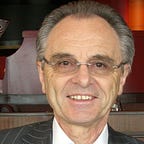50 Years In Tech. Part 7: A Resonant Apple France Message
by Jean-Louis Gassée
Combining my inclinations (and fear of confusion) with the seeds Steve Jobs had sown in Cupertino helped us craft a surprisingly unique and effective message for Apple in France.
In Part 6 of this series I recounted how much of a good time we had building Apple France as a service company to the retail trade — and didn’t say a word about end-users. But, unlike Lee Iacocca who, in his autobiography, called car dealers his customers, we were not mistaken, the people who ultimately count were people who bought Apple machines. They held our money in their pockets and our job, working with Apple retailers, was to arrange a smooth, happy — and repeatable — transfer of those monies towards our coffers.
To support the process, we needed to speak to end-users. And, for this, I drew inspiration from my February 1981 trip to Cupertino. I was thrilled to find an unusual (I’m avoiding the 1997 D word) computer company that exhibited an interest in artistic pursuits. For example, I fondly (and nostalgically) recall how the company published an Apple Magazine with, if my recollection is correct, a story by Johnathan Livingston Seagull’s author Richard Bach in one issue, and a Ray Bradbury poem titled Ode To The Quick Computer in another. I only recall the poem’s last verse: So cowards, what are you afraid of… One I would later use to kindly poke fun at students in France’s School of Government (ENA).
(I’d love to hear from a Monday Note reader with access to physical or electronic copies of these publications.)
This was exciting, it fit proclivities that caused trouble with my strict math and physics teachers and, more important, it pointed to an opportunity to position Apple in ways that would resonate with French culture and set us apart from more conventional (read boring) competitors.
In Cupertino, I had met Regis McKenna, Apple’s Eminence Grise, the Valley’s marketing guru who helped put Apple on the media map. We got along nicely and he smilingly approved of my simplified view of his trade: Marketing’s primary task is positioning, defining identity. Put another way, if you don’t have a clean, clear, resonant identity, there no story to tell — and your efforts and budgets are wasted.
Back in Paris, my views got support from masters of advertising such as Jacques Séguéla (RSCG) and Philippe Michel (CLM-BBDO). The latter once walked in an Apple Europe meeting to pitch an ad campaign, clicked his heels and went: ‘Ein Reich, Ein Volk, Ein BM’. A none-too-subtle allusion to IBM’s purported imperialism. Regrettably neither Séguéla nor Philippe Michel managed to produce memorable Apple advertising of the caliber we saw in the US, but they encouraged my search for a resonant story.
We zeroed on the raison d’être of Personal Computers, and on what Apple PCs did for humans.
Symbols, the alphabet and Hindu-Arabic numerals were humankind’s one of, if not the, most important inventions. With symbol strings, one could write Elizabethan poetry, religious scriptures, math, physics, Wall Street greed… But, as it turned out, we kept inventing much faster than our central nervous system evolved, it was left behind. As a result, we can’t memorize long strings, let alone perform complex combinations such as extracting a cubic root.
Then, Ray Bradbury’s Quick Computer comes to the rescue, it indefatigably stores and combines those strings. It returns what the gods stole from us — or so said one of Séguéla’s researchers who found PCs responded to three attributes: solipsistic, heuristic and promethean.
It sounds affected and probably shouldn’t be uttered in some circles. But two observations could be in order. First, it played well in French existentialist culture, one that a noted Lacanian analyst called focused on Being, as opposed, in America, to Doing. Second, our affection for PCs isn’t about bling, it is deep-seated because PCs extend the reach of our minds and bodies. And, as a bipolar acquaintance of mine once lucidly expressed, the solipsism attribute isn’t to be dismissed: the computer didn’t judge him and it helped him regain dignity as he could flex his programing muscle one-on-one.
Steve Jobs, who would later position Apple at the intersection of technology and liberal arts, called his machines bicycles for the mind. In France, at the time, we used ULMs (Ultralight Motorized planes) as a metaphor.
These, you will recall, were the early eighties. Confusion reigned when it came to personal computers, too often called microcomputers, leading to much misunderstanding on their role. ‘We don’t need your PCs, we already have mainframes, or minis.’ The classical It’s Like X, Only Smaller mental focus error that keeps giving.
So, we endeavored to put more specifics on the mind-body extension virtues of our PCs. Because we all need simple, sharp taxonomies, we decided our personal computers helped with five activities: Think, Organize, Communicate, Learn and Play. And we pointed to software products as examples.
There we had it: a well-defined identity based on deep-seated human yearnings, and a simple taxonomy of benefits.
Because I have what Buddhists call Monkey Brains (picture a cage inside my head with monkeys climbing around and shrieking), I was delighted. I like simple, resonant and easy-to-memorize story backbones. It worked. We got to own it, surprisingly undisputed by competitors who fell into never-ending feeds and speeds debates, into what Lacanian shrinks call (rightfully this time) Regressive Fixations On Partial Objects. As a safe non-carnal example, focusing on a car’s engine’s displacement, as opposed to the totality of how it drives — and looks.
In a following installment, I’ll get into what we did to spread our message thanks to Jacques Séguéla introducing us to PR genius Lionel Chouchan — and to a couple of nice little customer service epiphanies.
— JLG@mondaynote.com
